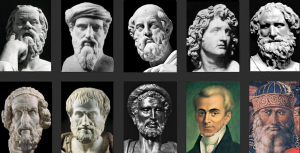
Tyrant, General (c.640 BC – c.568 BC)
Pittacus of Mytilene was a general from the island of Lesvos and one of the Seven Sages of ancient Greece. Essentially an autodidact, he was revered for his military might, his political prudence and his wisdom. He governed Mytilene for 10 years, establishing himself as one of the most important historical figures of the island and of Greek history.
Pittacus first entered politics when co-operating with the two brothers of Alcaeus Cicys and Antimenidas, the representatives of the aristocracy, killed the Lesvian tyrant Melagchron and took over as the new ruler of Lesvos. A few years later he was elected general of his peoples in the war against Athens. In the battle for Sigeion, a harbour in Hellispontus controlled by the Athenians, Pittacus challenged their general Phrynon, an Olympian in pankrateion, into a duel, whom he killed. Sigeion returned to Lesvian rule and Pittacus was honoured with a portion of land, for which he agreed to receive only the size equal to the distance where his javelin would reach. This part of land became known as “Land of Pittacus”.
After a series of political upheavals, Pittacus was granted complete by the people power over Lesvos, serving as general for a second time from 595 BC to 579 BC. Thus, he ruled in a system of “appointive tyranny” (αἰρετὴ τυραννίς), differing from the barbaric tyranny in that it was not based on heritage but resembled monarchy as the dictator was elected by the people.
As tyrant of Lesvos, Pittacus reformed the laws, changing the old legislation concerning monarchy and gave amnesty to all the exiled political rivals of the government. After ruling prudently for over a decade, Pittacus resigned wilfully from his position as Tyrant and died a few years later. By the time of his resignation, he had achieved fame throughout the whole Greece thanks to his wisdom and was visited by those seeking to hear his advices.
None of Pittacus’ works have survived. Multiple, however, quotes have been saved by Diogenes Laertius and Stobaeus attributed to Pittacus. Of those, the following are some of the most well-known:
«Συγγνώμη μετανοίας κρείσσων». – Forgiveness is better than pertinence. Another variant of the quote was “Forgiveness is better than revenge”.
«Ἄνδρα ἀγαθὸν ἀλαθέως γενέσθαι χαλεπόν». – “It is difficult for man to be genuinely good”.
«’Ανάγκα δ’ οὐδὲ θεοὶ μάχονται». – “Not even Gods cannot resist necessity”.
«Ἀρχὴ ἄνδρα δεικνύει». – “Power proves the man”.
«Τὰς νίκας ἄνευ αἵματος ποιεῖσθαι». – “Achieve victories without blood”.
«Σωφροσύνην φιλεῖν.» – “Love sophrosyne”.
«Συνετῶν ανδρῶν εἶναι, πρὶν γενέσθαι τὰ δυσχερῆ προνοῆσαι ὅπως μὴ γένηται, ἀνδρείων δὲ γενόμενα εὖ θέσθαι». – “It is for wise men to forsee, before the difficult things come, so that they do not happen, it is for the brave to face them, should they happen”.
Bibliography:
- “Pittacus”. Helios New Encyclopaedic Dictionary. N.I. Luvaris, Passas, I. Athens: 1946. Print.
- Ο Σοφότατος Πιττακός ο Μυτιληναίος. Ελλήνων Δίκτυο. Hellinon.net. Web. December 23, 2018.
- Πλεύρης, Κωνσταντῖνος. Ὁ Διωγμὸς τῶν Ἀρίστων. Ἤλεκτρον. Ἀθῆναι: 2013. Print.

[…] a contemporary of philosophers Thales and Anaximander, was student of Pittacus, one of the Seven Sages of antiquity, although to a large extent an autodidact. He founded his own […]
LikeLike
It’s almost 2024 and I’ve just found you so thank you!
LikeLike
It’s good that you research these well known figures and post for people to read even if it’s only a couple of people.
LikeLike
Thank you Athena. Knowledge is always preferred by few people these days.
LikeLiked by 1 person
I know it’s such a shame. I’ve saved your George Seferis post for a later reblog.
LikeLike